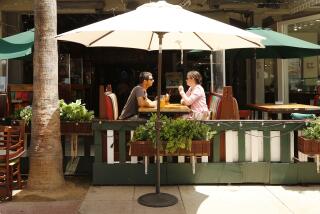In China, the Price Is Right, but Not for All
- Share via
“I think they charged me more because I’m a foreigner,” I said to a Chinese friend in Shanghai after I paid an unusually high price for a simple meal at a tiny, privately run restaurant.
My friend looked perplexed. “Of course they did,” he said.
The owner of the restaurant was merely following the example set by the Chinese government. In China, government-controlled prices of airplane and train tickets and hotel rooms are determined by race.
Foreigners who sign up for group tours are seldom aware of this pricing system because everyone in the group is paying the same price.
Foreigners who are not of Chinese ancestry pay the most. Overseas Chinese, such as Americans of Chinese descent, get cheaper prices in order to promote cultural ties. Chinese citizens and Chinese visitors from Hong Kong and Macao pay the least.
Better Service
In some cases, higher prices are warranted by better service. For example, foreigners joining a government-owned China Travel Service group in Hong Kong pay $892 for a six-day tour of Beijing and Xian (the city known for the terra cotta warriors).
Hong Kong Chinese can take a similar eight-day tour for only $479. But foreign tour groups usually stay at better hotels and include an English-speaking guide and some Western meals. And when airplanes or hotels are overbooked, those paying the top prices get priority.
In other cases, different prices are charged for the same service. On domestic flights in China a foreigner pays full fare, an overseas Chinese pays 80% and a Hong Kong Chinese pays 60%.
A foreigner would pay 438 yuan ($118 U.S.) for a one-way ticket between Beijing and Guangzhou, a Chinese-American would pay 350 yuan ($94) and a Hong Kong Chinese would pay 270 yuan ($72).
On the express train from Hong Kong to Guangzhou a foreigner is charged the equivalent of $23.71, a Chinese-American sitting next to him would pay $19.23 and a Hong Kong Chinese would ride for $12.82.
Even if foreigners were willing to sign up for a Hong Kong Chinese tour conducted in Cantonese, they would be charged extra.
For example, a seven-day trip from Hong Kong to Guangzhou, Beijing, Zian and Shanghai would cost Hong Kong Chinese the equivalent of $256.
A foreigner would be charged an extra $89. Part of that is to cover the cost of a visa, which is not required of Hong Kong Chinese, and part covers the higher price of the foreigner’s airline ticket.
Hotes, Restaurants Too
Some hotels charge foreigners more than Hong Kong Chinese for identical rooms. And some restaurants charge foreigners more than Chinese for identical meals.
On one occasion, I wanted to treat some Chinese friends to dinner in Beijing. “We’ll pay, and you can pay us back tomorrow,” one of them said. “If you pay the bill, they’ll charge you twice as much for the same meal.”
China justifies the different prices by the fact that most foreigners earn salaries that are tremendously higher than Chinese wages.
For example, the average urban worker in China earns a mere $27 a month and lives in government-subsidized housing.
But some foreigners object to this reasoning. They argue that no other countries base prices on a person’s race or income, and they say that foreigners are not responsible for the low wages in China.
An American woman living in Hong Kong said that she once had to stand during a six-hour ride on an overcrowded train, yet she still had to pay substantially more than the Chinese. She also said that many Hong Kong Chinese, who are charged less, earn salaries much higher than hers.
On the other hand, just because Chinese citizens can afford airplane tickets doesn’t mean that they can buy one. Because there is a shortage of tickets, the Chinese citizen must either be on official business or have connections with someone who can buy a ticket.
Another Inequality
While foreigners are upset about paying higher prices, Chinese complain about another type of inequality. In most Chinese cities a Chinese citizen cannot even enter a major hotel except on official business.
The ambiguous price system creates an atmosphere ripe for cheating. One American college student was told by the driver of a hotel van in Beijing that a ride to the Summer Palace would cost 40 yuan (about $10 U.S.). When the student complained, the driver lowered the price to 2 yuan.
The same student was told by a clerk at China’s state-owned CAAC airline that only first-class tickets were available for his flight. The student insisted on an economy ticket and, after everyone boarded, there were many empty seats in that section.
Other solo travelers say that checking into Chinese hotels involves tedious bargaining. At first the front desk clerk will say that no rooms are available. Later he will admit that there are some rooms, but at an outrageously high price. After negotiations, a room will be offered at a fair price.
Ability to Pay
Chinese officials insist that ability to pay--not race--is the factor in determining prices. But China Travel Service seems to indicate otherwise.
An American in Hong Kong went to China Travel Service to buy tickets for a group tour of China for a British friend, the friend’s Hong Kong Chinese wife and their child.
The clerk said that because the wife was Hong Kong Chinese her ticket would be cheaper than her husband’s.
“What about their child?” the American asked.
“A child’s ticket is 60% of an adult’s,” the clerk replied.
More to Read
Sign up for The Wild
We’ll help you find the best places to hike, bike and run, as well as the perfect silent spots for meditation and yoga.
You may occasionally receive promotional content from the Los Angeles Times.






